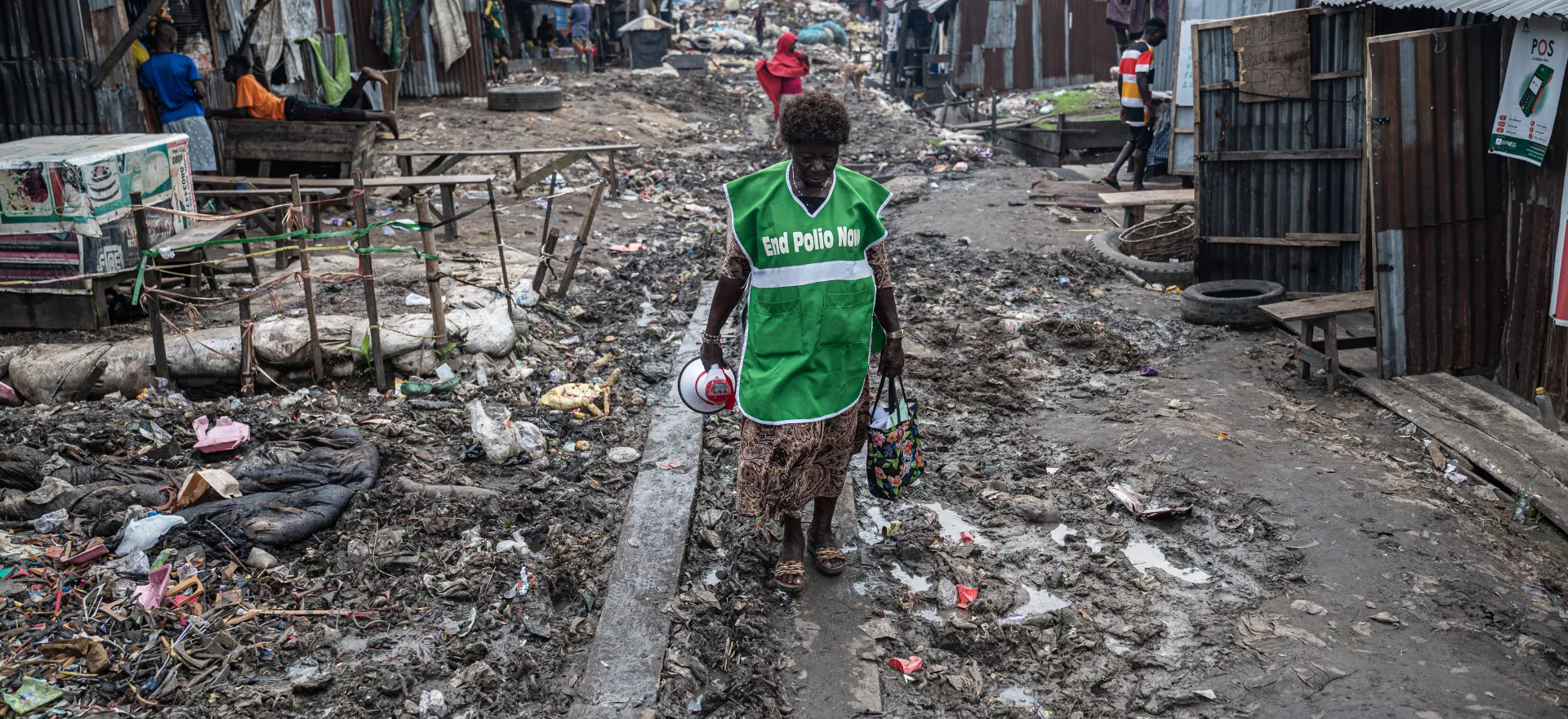
Health workers are reaching zero-dose children in Nigeria’s urban slums
Focusing on overcoming barriers that prevent mothers from vaccinating their children.
On a typical Tuesday morning, Jemlat would have been hard at work hawking bread on the crowded streets of Gengere, a shanty-filled neighbourhood at the end of the popular Mile 12 Market in Lagos.
But one Tuesday, short of money to buy her inventory, Jemlat and her four-year-old son Fawaz took a slow disappointed walk home and happened on a life-saving opportunity: a team of health workers providing vaccines to protect children against potentially lethal diseases.
Jemlat jumped at the opportunity.

UNICEF/U.S. CDC/UN0669695/Nelson Apochi Owoicho

UNICEF/U.S. CDC/UN0669672/Nelson Apochi Owoicho
“My son has never been vaccinated but he has also never been terribly ill,” Jemlat said. “He was born in my grandmother’s church.”
For Fawaz, vaccination was a bit of a shock and he let out a yell. Health workers quickly comforted him with biscuits. With a first set of vaccines, Fawaz was on the way to being protected from life-threatening diseases including measles and polio.
“I want my child to succeed. That is my greatest ambition now.’’
Though Gengere sits on the outskirts of one of the world’s greatest financial centres, vaccination services are not easily accessible for a population that faces challenges including poverty, low levels of education, little free time and limited means for reaching even relatively nearby health services.
Once a temporary shelter for wholesalers at the nearby 12 Mile Market, Gengere has mushroomed into a sprawling neighbourhood of noise and garbage. Basic services such as water, sanitation and education are scarce. Crime is plentiful. The nearest primary health care centre is more than 5 kilometres away.

Nigeria is home to the second largest number of zero-dose children in the world, 2.2 million. In Lagos State, the Alimosho Local Government Area (LGA) had over 35,000 zero-dose children in 2021, the highest number of any LGA in Nigeria. The LGA where Jemlat and her son live, Kosofe, had nearly 17,000 zero-dose children in 2021. It also had around 17,162 partially immunized children, the second highest number for an LGA in Lagos State.
2.2 million children in Nigeria never received a vaccination
The country health officials and partners have long worked to overcome the barriers that prevent mothers from vaccinating their children. However, addressing these barriers requires multiple kinds of outreach efforts, said Elizabeth Unoroh, the state immunization officer for Lagos. One approach is the Routine Immunization Intensification Programme. With support from UNICEF and the United States Government, the programme provides weekly integrated immunization outreach aimed specifically at reducing the number of zero-dose children in the State.

UNICEF/U.S. CDC/UN0669719/Nelson Apochi Owoicho

UNICEF/U.S. CDC/UN0677786/Nelson Apochi Owoicho
However, in Gengere, where much of the population is in constant transition, reaching children on the move demands daily outreach, increased funding and more neighbourhood-level primary health care, Unoroh said.
On the day Fawaz received his first vaccines, the mobile outreach team was deployed as part of a daily effort to reach zero-dose children and vaccinate them against vaccine preventable diseases including measles and polio, and their caregivers against COVID-19. The team also provided Vitamin A supplements.
Another resident, Esther Sunday, was among the first mothers to get in line to take advantage of the services in Gengere.
Esther gave birth to her son Samuel in 2021 in a Lagos hospital, where he received a dose of Bacille Calmette-Guérin (BCG), the vaccine that protects against tuberculosis. But since then, Samuel had not received any vaccines. At the Gengere health post, Samuel was immunized with all diphtheria, tetanus and pertussis-containing (DTP) vaccines – the backlog of vaccine doses he had missed.

UNICEF/U.S. CDC/UN0669690/Nelson Apochi Owoicho

UNICEF/U.S. CDC/UN0671172/Nelson Apochi Owoicho
As a single mother of three children, Esther makes her living washing laundry for residents of a nearby residential estate. She started working at about age 10 when her parents sent her to work as an apprentice for a food vendor in the rural area where they lived.
Like Samuel, the majority of zero-dose children in Nigeria are born to poor struggling families. To get by, many caregivers keep multiple low-paying jobs in communities where health-care facilities are not available. For these families, access to routine immunization services means paying transport – a further stretch of their already lean financial resources.
In Gengere, Esther pays about US$1.50 a day for her lodging and about US$0.50 a day for water and the use of a toilet. The outreach was her main opportunity to secure vaccinations for Samuel because taking Samuel to the nearest health centre would cost about half her daily income.
“I would be homeless if I didn’t work for one day,”





